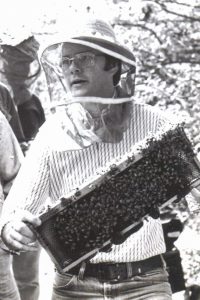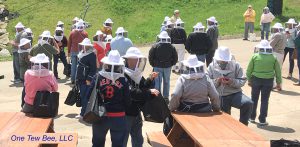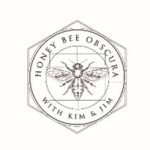
[ad_1]
Click on Right here in the event you listened. We’d like to know what you assume. There may be even a spot for suggestions!
Learn alongside under!

James E. Tew, Fifty Years In the past
What New Beekeepers Ought to Know About Previous Beekeepers
Previous beekeepers actually do imply to be useful.
By: James E. Tew
Jumbled ideas
I do know what I need to say, however my ideas are tumbling over one another. Let me begin like this, “When is one an previous beekeeper with huge expertise – or – when is one an previous beekeeper who lives prior to now an excessive amount of?”
For example, take into account five-gallon pails. An skilled beekeeper may say, “Yeah, I definitely bear in mind these previous 60# steel tins we used to place honey in. Keep in mind these small, painful wire handles? Keep in mind how the solder joint may break on these handles and drop a 60# can of honey in your foot? However having straight sides, they positive stacked properly.”

Determine 1. Filling 60# honey tins. Be aware A.I. Root honey settling tanks
Or an previous beekeeper may say, “I bear in mind these 60# honey tins, however I feel plastic 5 gallon buckets are significantly better. Higher handles and far simpler to wash and pour honey from (1).” When is info from an skilled beekeeper actually serving to a brand new beekeeper and when is it only a stroll down reminiscence lane?
Why these ideas in any respect?
I’m having these ideas as a result of every thing adjustments. Throughout the previous three to 4 a long time, issues have actually modified in beekeeping. Mites, small hive beetles, viral pathogens and herbicides have amalgamated to fully restructure beekeeping. A lot has modified in administration, tools, bee shares, honey manufacturing and pollination companies as to make many established suggestions unsure or ineffective.
For example, proper now, I ought to be writing an article for beekeepers describing what they need to be doing for Spring administration. What ought to I write? Years in the past, Roy Hendrickson (2) mentioned Spring administration in a superb article and I did a bit entitled, “A contemporary have a look at the ideas of Spring administration of bee colonies”, in April 2007. Larry Connor (3) when referring to the 1960’s beekeeping hauntingly mentioned, “…That was a time earlier than tracheal mites, Varroa mites, small hive beetles, CCD, neonicotinoids and African bees…” Good grief! That’s just about what I mentioned just some sentences in the past. We seemingly are stepping throughout ourselves attempting to advise new beekeepers once I sense that previous beekeepers need assistance as a lot as anybody.
Right now, the penalty for errors is far higher.
As a beekeeper educated within the ‘70s, I generally made errors however the results of my errors had been hardly ever extreme. By chance killing a queen was paramount to a nasty day, however queens had been available and never pricey. Not true for at this time’s beekeeper.
All these years in the past, colonies nonetheless died throughout the Winter, however only some suffered that destiny – and so what – you can readily make up the distinction by choosing up swarms the following Spring. Not true for at this time’s new beekeeper. Mature colonies had been hardy and will attain massive populations with little to no intervention by the meddling beekeeper. Splits had been simpler to make. Right now’s colonies are extra delicate, extra fragile. I don’t know why. Good colonies can immediately fail.
It appears to me that the brand new beekeeper is extra pressured to get issues proper faster and with out errors. More and more, I’ve change into a bit mouthy about new beekeepers attempting to implement all of the previous administration suggestions – plus all the brand new ones. Reversing brood chambers, frequent requeening, mite remedies, comb substitute, pollen substitutes, feeding drugs, tearing down swarm cells… It’s a conundrum. The brand new beekeeper must study to handle bees, however in studying administration strategies, the brand new beekeeper is punished for making errors. (Simply so you understand, at this time’s skilled beekeepers are additionally penalized mightily for making administration errors, too.)
However I’m forward of myself – Right now, getting bees is way more tough
All my penalty feedback beforehand assume the brand new beekeeper was even capable of purchase bees. Whereas I’m not a fossil beekeeper, in my early bee years, I paid lower than $2.00 for a brand new queen. Right now’s new beekeeper can simply pay fifteen occasions that low value for a queen – if any are even obtainable.
Package deal bee producers had been in all places. The U.S. Postal System readily shipped them to me. Or I may purchase established colonies or splits. They had been marketed in farm papers, bee membership newsletters and by word-of-mouth. Now, a swarm name is a uncommon factor. Bees are tougher to get. Right now’s new beekeeper should make cautious plans to order packages and prepare to get them, in all probability by a membership or by a bulk order.
Heaven forbid that something go improper with the bundle set up course of. Oh, so your bundle queen died? I hope you’ll find one other one as a result of the bundle producer might be not sending extras the way in which they as soon as did. So right here we’re once more… making errors in putting in packages at this time has higher penalties than it did just a few a long time in the past.
When computer systems and laptop programs had been younger, I may contact my “College IT individuals” and they’d come troubleshoot my 8088 chip, twin floppy drive laptop. Invariably they needed to reset a few of my dip switches or some such. Does anybody assume that I’ve that sort of assist at this time? Solely catastrophic laptop points are addressed (for pay) however for software program or common {hardware} questions – I need to log on and seek for solutions. Right now, I’m by myself if my laptop system hiccups. My laptop upkeep scenario is just like fashionable beekeepers.

Determine 2. A useless queen – extra of an issue at this time.
Years in the past, honey bee queens had been kinda assured by the producer. One thing went improper – name the queen grower up. This previous season, I had a few of the queens in my packages die. A pair had been useless within the cage earlier than I even launched the bundle. It was not my fault, however I received no free queen replacements. That assured queen factor has almost handed. I ended up with a number of six pound packages once I needed to mix queenless three pound packages with queenright packages. Let the brand new beekeeper beware.
Don’t do this at residence
For this queen motive and a number of other others, I by accident labored out a process that I’ll strive once more. That is not a advice for you and should by no means be one. I used to be simply tinkering.
Of the three-pound packages I had, I took two for a novel launch process. I launched one of many packages within the typical means, however I additionally opened the second bundle and launched about two kilos of the bees in with the primary unit. I used the remaining queen and the final pound of bees to ascertain a small nucleus colony. So, I basically had a 5 pound bundle and a one pound bundle.
As I anticipated, the 5 pound unit developed rapidly. If queen issues had arisen, I had a queen (considerably) in reserve. Certainly, no issues arose. Because the season progressed, I equalized the colonies and at present all is properly with the 2 colonies. The query you have to be asking and it’s a query I can not reply, “Did I develop extra bees from these two packages as a result of I used this course of?” I don’t but know, ergo the explanation why this isn’t a advice. If I strive it once more, I will provide you with an replace. Stand by.
Beekeeping info know-how then and now
The previous system of bee info dispersal remains to be alive and considerably properly. Fingers-on bee schooling courses are nonetheless provided, scores of bee books can be found and it appears there’s a bee assembly someplace almost each night time. Bee lovers speaking, taking a look at footage and folks studying all about bees – that hasn’t modified, however different issues have modified.
There was a time once I was assured that I knew extra about bees than most individuals within the room however not anymore. The brand new beekeeper can go to the online for actually something regarding beekeeping (or anything). I merely can not learn the 1000’s of bee-related net pages. Invariably somebody has learn one thing that I’ve not seen.
However right here’s the brand new duty for the brand new beekeeper – not all web-based info is correct. For example, it isn’t a viable process to maneuver a colony having laying employees just a few yards away, shake the bees from the colony and substitute the hive on the unique stand. The thought is that the laying employees won’t be able to seek out their means residence, however that isn’t true. Laying employees can discover their means residence very properly. But, in the event you Google the descriptor “shaking bees for laying employee management” many hits are offered that give directions for this course of. Let the brand new beekeeper beware.
Bee business compartmentalization
The beekeeping business has at all times been an assemblage of subgroups that got here collectively on bee assembly days. Interest beekeepers, sideline beekeepers, industrial beekeepers, tools distributors, regulatory individuals and college/USDA bee professors had been a few of the typical sub-groups that comprised the viewers. Right now’s new beekeeper will nonetheless be uncovered to a segmented business, however totally different segments than from just a few a long time in the past. Interest and sideline beekeepers appear to have been mixed. Industrial beekeepers are uncommon at most small conferences. Industrial beekeeper numbers are fewer. Industrial beekeepers have change into so specialised as to just about be in a unique business than the pastime beekeeper.
Interest beekeepers – new and previous
A few years in the past, when Colony Collapse Dysfunction was in its infancy, I used to be in a gathering with an Ohio legislative consultant when, in reference to pastime beekeepers, he abruptly mentioned, “Don’t ever use the time period, pastime beekeeper, once more.” He continued that both you’re a beekeeper or you aren’t. No funding company goes to fund hobbies. I used to be fully surprised. This one particular person had abruptly made a time period generally present in tons of of bee books out of date. My very first response was to assume that the “pastime” time period merely couldn’t die however after contemplating the thought for a couple of minutes and seeing the opinioned firmness of the consultant, I spotted that, in Ohio no less than, I had in all probability simply witnessed the dying of a time-honored time period.
Since that point, I’ve attended two state conferences far faraway from Ohio the place the presenting speaker admonished the group to delete the pastime phrase. Right now’s pastime beekeeper is only a beekeeper. The time period “sideline” beekeeper was at all times a pressured match, too. So at this time, inside the bee business, there are basically beekeepers and industrial beekeepers. Now, I sense that the inhabitants of beekeepers has been loosely divided into pre-varroa (previous) and post-varroa beekeepers (new). Nonetheless, even when it is a designation, as previous beekeepers move, the post-varroa group will take over.
Tutorial beekeepers
Previous bee professors had been as a lot a beekeeper as they had been a scientist. They generally attended bee conferences even when they weren’t audio system on this system. Drs. Walter Rothenbuhler and Basil Furgala are examples of scientists from this period. USDA-ARS scientists had been governmentally funded and never encumbered with the duty to get outdoors grants. They had been inspired to work on issues that had instant and direct results on the business. For example, B.F. Detroy was a USDA-ARS beekeeping engineer who labored on tasks like creating steam-heated uncapping knives, insulating beehives and pollen traps designs.
For a lot of authentic causes, educational beekeeping at this time is almost fully faraway from the sensible bee business. The research they implement are specialised and conclusions drawn are sophisticated. In eras previous, educational beekeepers had been merely doing their jobs when working with the bee business. Right now’s educational beekeeper is pressured to get outdoors funding and to succeed contained in the broader scientific neighborhood. That inner scientific success can have little to do with the day-to-day lifetime of the everyday beekeeper. This isn’t or dangerous factor, however it’s a totally different factor from the way in which educational beekeeping was years in the past.
Nonetheless jumbled
My ideas are nonetheless muddled, however I do know what was an unsure feeling as I stood earlier than the group at a latest county assembly. It was a contemporary group made up of latest and previous beekeepers. These of us within the previous group have paternal emotions and need to assist these new beekeepers at each flip. Even this journal just lately has had articles on methods to nurture new beekeepers. That appears like present suggestions for serving to bee colonies. We’ve got the most effective intentions however our support packages steadily hurt our colonies as a lot as they assist.
True, previous beekeepers will help with the mechanics of beekeeping, however at this time’s bright-eyed, keen, new beekeeper by no means knew bees with out mites, poor queens, herbicides and imported honey. They don’t count on bee professors to grace their conferences. As an alternative, they’ll preserve bees on the town extra typically than the countryside and after they want info, they’ll search the online or weblog or podcast. In a pinch, they’ll use old style e-mail. When requesting info, they’ll hardly ever use a land-line telephone and can by no means, ever write an precise letter.

Determine 3. A batch of latest beekeepers. Are you able to choose them out?
My final thought on the topic
Attributable to mites, pesticides, viruses, bee illnesses and imported honey, in some ways, we’re ALL new beekeepers. Previous beekeepers know extra concerning the mechanics and fundamentals of bees and beekeeping however the brand new group is aware of extra about at this time’s means of speaking and implementing fashionable beekeeping ideas. New beekeepers aren’t saddled to the previous. New beekeepers live of their current. To outlive and thrive on this altering bee world, previous beekeepers in all probability want new beekeepers as a lot as the brand new wants the previous. We’re all in the identical bee boat and for all of us, it’s a brand new boat.
Dr. James E. Tew
Emeritus College, Entomology
The Ohio State College
tewbee2@gmail.com
 Co-Host, Honey Bee Obscura Podcast
Co-Host, Honey Bee Obscura Podcast
www.honeybeeobscura.com
(1) However now I’m questioning concerning the microplastic content material of plastic honey buckets when crystallized honey is heated in plastic buckets.
(2) Hendrickson, Roy. 2008. Spring Administration of Overwintered Colonies. Bee Tradition, Feb. 2008. Vol 136, No.2
(3) Connor, Lawrence. 2009. Altering the way in which we prepare new beekeepers. Bee Tradition, Sep. 2009 Vol 137, No. 9
[ad_2]